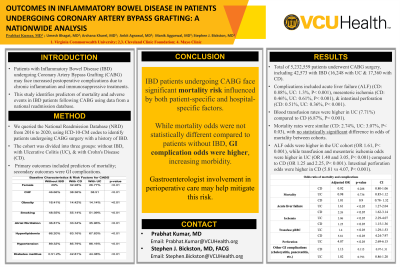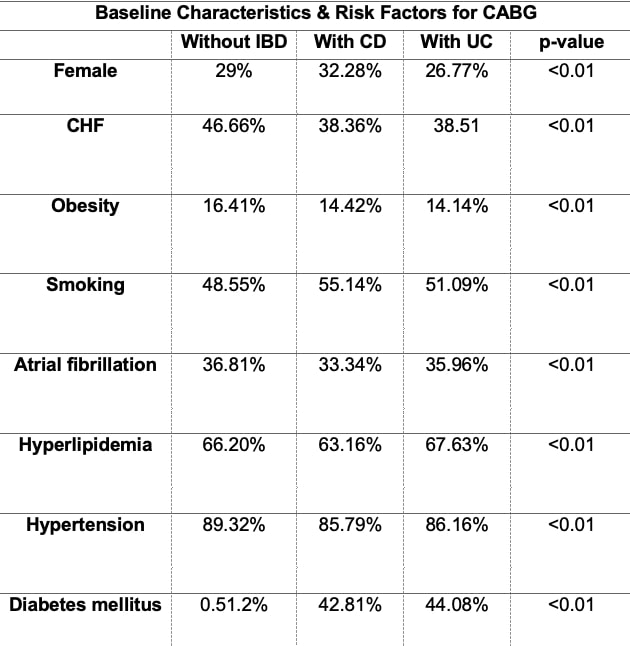Sunday Poster Session
Category: IBD
P0946 - Outcomes in Inflammatory Bowel Disease in Patients Undergoing Coronary Artery Bypass Grafting: A Nationwide Analysis
Sunday, October 27, 2024
3:30 PM - 7:00 PM ET
Location: Exhibit Hall E

Has Audio

Prabhat Kumar, MD
Cleveland Clinic Foundation
Richmond, VA
Presenting Author(s)
Prabhat Kumar, MD1, Umesh Bhagat, MD1, Archana Kharel, MD1, Ankit Agrawal, MD1, Manik Aggarwal, MBBS2, Stephen J. Bickston, MD, FACG3
1Cleveland Clinic Foundation, Cleveland, OH; 2Mayo Clinic, Rochester, MN; 3Virginia Commonwealth University Health System, Richmond, VA
Introduction: Patients with Inflammatory Bowel Disease (IBD) undergoing Coronary Artery Bypass Grafting (CABG) may face increased postoperative complications due to chronic inflammation and immunosuppressive treatments. This study identifies predictors of mortality and adverse events in IBD patients following CABG using data from a national readmission database.
Methods: We queried the National Readmission Database (NRD) from 2016 to 2020, using ICD-10-CM codes to identify patients undergoing CABG surgery with a history of IBD. The cohort was divided into three groups: without IBD, with Ulcerative Colitis (UC), and with Crohn's Disease (CD). Primary outcomes included predictors of mortality; secondary outcomes were gastrointestinal (GI) complications. Analysis was performed with STATA software using T-tests for continuous variables and chi-square tests for categorical variables. Univariate and multivariate analyses were used to compare outcomes with patients without IBD.
Results: A total of 5,232,559 patients underwent CABG surgery, including 42,573 with IBD (16,248 with UC and 17,360 with CD) [Image]. In the IBD cohort, the majority were males with typical cardiovascular complications like hypertension, hyperlipidemia, diabetes, and peripheral vascular disease. Complications included acute liver failure (ALF) (CD: 0.88%, UC: 1.3%, P< 0.001), mesenteric ischemia (CD: 0.46%, UC: 0.61%, P< 0.001), and intestinal perforation (CD: 0.51%, UC: 0.36%, P< 0.001). Blood transfusion rates were higher in UC (7.71%) compared to CD (6.87%, P< 0.001). Mortality rates were similar (CD: 2.74%, UC: 3.07%, P< 0.03), with no statistically significant difference in odds of mortality between cohorts (OR 0.92, P=0.288 vs OR 0.97, P=0.736). ALF odds were higher in the UC cohort (OR 1.61, P< 0.001), while transfusion and mesenteric ischemia odds were higher in UC (OR 1.40 and 3.05, P< 0.001) compared to CD (OR 1.25 and 2.25, P< 0.001). Intestinal perforation odds were higher in CD (5.81 vs 4.07, P< 0.001) [Table].
Discussion:

Note: The table for this abstract can be viewed in the ePoster Gallery section of the ACG 2024 ePoster Site or in The American Journal of Gastroenterology's abstract supplement issue, both of which will be available starting October 27, 2024.
Disclosures:
Prabhat Kumar, MD1, Umesh Bhagat, MD1, Archana Kharel, MD1, Ankit Agrawal, MD1, Manik Aggarwal, MBBS2, Stephen J. Bickston, MD, FACG3. P0946 - Outcomes in Inflammatory Bowel Disease in Patients Undergoing Coronary Artery Bypass Grafting: A Nationwide Analysis, ACG 2024 Annual Scientific Meeting Abstracts. Philadelphia, PA: American College of Gastroenterology.
1Cleveland Clinic Foundation, Cleveland, OH; 2Mayo Clinic, Rochester, MN; 3Virginia Commonwealth University Health System, Richmond, VA
Introduction: Patients with Inflammatory Bowel Disease (IBD) undergoing Coronary Artery Bypass Grafting (CABG) may face increased postoperative complications due to chronic inflammation and immunosuppressive treatments. This study identifies predictors of mortality and adverse events in IBD patients following CABG using data from a national readmission database.
Methods: We queried the National Readmission Database (NRD) from 2016 to 2020, using ICD-10-CM codes to identify patients undergoing CABG surgery with a history of IBD. The cohort was divided into three groups: without IBD, with Ulcerative Colitis (UC), and with Crohn's Disease (CD). Primary outcomes included predictors of mortality; secondary outcomes were gastrointestinal (GI) complications. Analysis was performed with STATA software using T-tests for continuous variables and chi-square tests for categorical variables. Univariate and multivariate analyses were used to compare outcomes with patients without IBD.
Results: A total of 5,232,559 patients underwent CABG surgery, including 42,573 with IBD (16,248 with UC and 17,360 with CD) [Image]. In the IBD cohort, the majority were males with typical cardiovascular complications like hypertension, hyperlipidemia, diabetes, and peripheral vascular disease. Complications included acute liver failure (ALF) (CD: 0.88%, UC: 1.3%, P< 0.001), mesenteric ischemia (CD: 0.46%, UC: 0.61%, P< 0.001), and intestinal perforation (CD: 0.51%, UC: 0.36%, P< 0.001). Blood transfusion rates were higher in UC (7.71%) compared to CD (6.87%, P< 0.001). Mortality rates were similar (CD: 2.74%, UC: 3.07%, P< 0.03), with no statistically significant difference in odds of mortality between cohorts (OR 0.92, P=0.288 vs OR 0.97, P=0.736). ALF odds were higher in the UC cohort (OR 1.61, P< 0.001), while transfusion and mesenteric ischemia odds were higher in UC (OR 1.40 and 3.05, P< 0.001) compared to CD (OR 1.25 and 2.25, P< 0.001). Intestinal perforation odds were higher in CD (5.81 vs 4.07, P< 0.001) [Table].
Discussion:

Figure: Image: Baseline characteristics and risk factors for CABG
Note: The table for this abstract can be viewed in the ePoster Gallery section of the ACG 2024 ePoster Site or in The American Journal of Gastroenterology's abstract supplement issue, both of which will be available starting October 27, 2024.
Disclosures:
Prabhat Kumar indicated no relevant financial relationships.
Umesh Bhagat indicated no relevant financial relationships.
Archana Kharel indicated no relevant financial relationships.
Ankit Agrawal indicated no relevant financial relationships.
Manik Aggarwal indicated no relevant financial relationships.
Stephen Bickston indicated no relevant financial relationships.
Prabhat Kumar, MD1, Umesh Bhagat, MD1, Archana Kharel, MD1, Ankit Agrawal, MD1, Manik Aggarwal, MBBS2, Stephen J. Bickston, MD, FACG3. P0946 - Outcomes in Inflammatory Bowel Disease in Patients Undergoing Coronary Artery Bypass Grafting: A Nationwide Analysis, ACG 2024 Annual Scientific Meeting Abstracts. Philadelphia, PA: American College of Gastroenterology.
